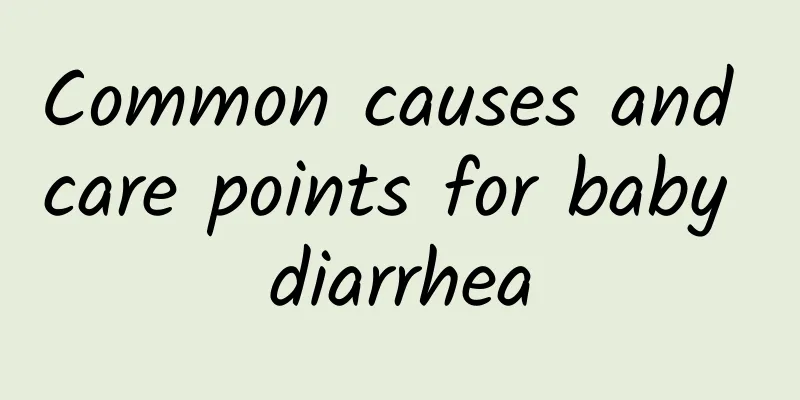Common causes and care points for baby diarrhea

|
Diarrhea is one of the common digestive system diseases in infants and young children. For new parents, it is very important to understand the common causes and care points of baby diarrhea. We will introduce the common causes of baby diarrhea in detail and give corresponding care suggestions to help parents take better care of their babies and promote their healthy growth. 1. Common causes of diarrhea in babies 1. Improper diet The baby's gastrointestinal function is not fully developed, and the digestion and absorption capacity of food is limited. Improper diet, such as overfeeding, food allergy or intolerance, etc., may cause diarrhea in babies. In addition, improper addition of complementary food, such as adding it too early or too late, may also cause diarrhea in babies. 2. Infectious diarrhea There are a lot of bacteria and viruses in the environment that babies are exposed to. If the sanitary conditions are poor or the baby's immunity is reduced, it is easy to be infected with diarrheal viruses or bacteria, such as rotavirus, E. coli, etc. After these pathogens invade the baby's intestines, they will cause intestinal inflammation and lead to diarrhea. 3. Cold abdomen The baby's body temperature regulation center is not fully developed, and the baby's resistance to cold is weak. If the abdomen is cold, it will cause gastrointestinal motility to speed up and cause diarrhea. 4. Drug factors Certain drugs, such as antibiotics, can disrupt the balance of the baby's intestinal flora and cause diarrhea. In addition, some Chinese medicines or health products may also cause diarrhea in babies. 2. Key points for nursing care of baby diarrhea 1. Adjust your diet During the period of diarrhea, parents should adjust the baby's diet appropriately. For breastfed babies, mothers should pay attention to dietary hygiene and avoid consuming too greasy, spicy or cold food. For bottle-fed babies, diarrhea milk powder or diluted ordinary milk powder can be selected. At the same time, the baby's food intake should be controlled to avoid overfeeding. When adding complementary foods, the principle of starting from less to more, from thin to thick, should be followed to gradually adapt. 2. Maintain hygiene During the period when the baby has diarrhea, parents should pay special attention to the baby's hygiene. Change diapers in time, clean the baby's bottom and keep it dry. At the same time, clean the baby's toys, tableware and clothes regularly to avoid bacterial growth. In addition, parents should wash their hands before and after contacting the baby to prevent cross infection. 3. Observe the condition During the period of diarrhea, parents should closely observe the baby's condition. Pay attention to the baby's mental state, appetite, urine volume, etc., so as to detect abnormal conditions in time. If the baby has symptoms such as high fever, dehydration, and mental depression, seek medical attention in time. 4. Stay hydrated Diarrhea can cause a large amount of water loss in the baby's body, so it is very important to replenish water. Parents can feed the baby some warm water, light salt water or glucose water to replenish the water and electrolytes needed by the body. If the baby refuses to drink water or vomits after drinking water, you should seek medical attention in time. 5. Rational use of drugs During the period of diarrhea in babies, parents should use medicines reasonably according to the doctor's advice. Do not blindly use antibiotics or other antidiarrheal drugs to avoid aggravating the condition or causing other complications. If medication is necessary, follow the doctor's advice and pay attention to the dosage and usage of the medicine. 6. Keep your abdomen warm During the period of diarrhea, parents should pay attention to keeping the baby warm, especially the abdomen. You can put cotton, breathable clothes on the baby to prevent the abdomen from getting cold. At the same time, you can use hot water bottles or heat packs and other warming items for the baby, but be careful to avoid burns. 7. Psychological care During the period of diarrhea, babies may become irritable and restless due to physical discomfort. Parents should give their babies enough care and comfort to accompany them through this difficult time. At the same time, parents should also remain calm and patient, and not be too anxious or nervous, so as not to affect the baby's mood. 3. Some suggestions for preventing baby diarrhea 1. Develop good eating habits Parents should guide their babies to develop good eating habits and avoid problems such as overfeeding or food allergies. When adding complementary foods, parents should follow the principle of starting from less to more, from thin to thick, and gradually adapt. 2. Pay attention to hygiene Parents should regularly clean their baby's toys, tableware and clothes and keep the indoor environment clean. At the same time, parents should wash their hands before and after contacting their baby to prevent cross infection. 3. Vaccination According to the doctor's advice, vaccinate your baby with relevant vaccines in a timely manner to improve your baby's immunity and prevent infectious diarrhea. 4. Avoid substance abuse Parents should avoid abusing antibiotics and other drugs for their babies, so as not to disrupt the balance of intestinal flora and cause diarrhea. If medication is necessary, follow the doctor's advice and pay attention to the dosage and usage of the medication. IV. Conclusion In short, baby diarrhea is a common digestive system disease. Parents should understand the common causes and care points of diarrhea so that they can deal with it promptly and effectively when their baby has diarrhea. At the same time, parents should also pay attention to preventing the occurrence of baby diarrhea to protect the baby's healthy growth. In daily life, parents should pay attention to the baby's diet, hygiene, living habits, etc., to improve the baby's resistance and reduce the occurrence of diarrhea. Author: Xuan Xiaoying Qian'an Traditional Chinese Medicine Hospital |
<<: Family management and first aid knowledge of childhood asthma
>>: 【Oral Science Knowledge】Treatment of dental caries
Recommend
What department should I go to for prenatal checkup?
Both the pregnant father and the pregnant mother ...
Can I get pregnant if my menstrual flow is on time and small?
Every woman needs to experience the menstrual pro...
Female thumb nail depression
My fingernails used to be very flat, but during t...
Urinary tract infection after one day of intercourse
Urinary tract infection can occur at any age, bot...
What causes blood clots during menstruation?
Some women will experience blood clots during men...
Heart and brain connected, different diseases treated with the same method
Author: Liu Xiaolu, deputy chief physician, Pekin...
Is colposcopy painful?
The physical health of each of us is very importa...
Can drinking brown sugar water during menstruation really relieve dysmenorrhea? The truth is different from what you think
Rumor: "During menstruation, drinking brown ...
How to choose hearing aids?
At present, deafness is gradually becoming a comm...
How to eat for pregnant women to grow the fetus without gaining weight
Diet for pregnant women is very important. The nu...
What are the effects of having your hair done during pregnancy?
Pregnant women should try to avoid contact with v...
How to replenish the deficiency of Qi and blood in women?
In real life, many women experience physical fati...
Causes and treatment of night sweats in women
When it comes to night sweats, everyone knows it....
What are the treatments for polycystic ovary syndrome?
Polycystic ovary syndrome is a disease that many ...
People around you have fever again? Don't worry! The culprits are influenza A and norovirus
"Is the epidemic coming again? Everything wa...









